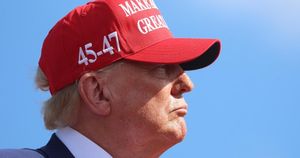Protests erupted across Pakistan following the recent imprisonment of former Prime Minister Imran Khan, with thousands of supporters rallying under the banner of his party, Pakistan Tehreek-e-Insaf (PTI). Emotional and fierce, the demonstrations reflect not only support for Khan but also widespread discontent with the current government, led by Prime Minister Shehbaz Sharif.
These protests mark the latest chapter in Pakistan’s politically charged atmosphere. The turmoil began when Khan was sentenced to three years for corrupt practices, which he and his supporters insist is a politically motivated decision aimed at undermining his party’s influence. His imprisonment has drawn comparisons to past political turbulence, sparking memories of previous leaders facing similar pressures.
On November 26, 2024, PTI supporters initiated their march toward Islamabad’s D-Chowk, signaling their determination to keep the pressure on the government. Bushra Bibi, Khan’s wife, has emerged as one of the vehement voices at the forefront of this movement. Speaking passionately to the crowds, she stated, "My brothers, as long as Imran is not with us, we will not end this march. I will stay there till my last breath, and all of you have to support me. This is not just about my husband but about the country and its leader.” Her words have fueled the protestors' resolve, as they clashed with police en route.
Violence broke out during these clashes, leading to at least one police officer's death and injuries to over a hundred others, some critically. The strife highlights the precarious balance between protestor demands and government authority. Interior Minister Mohsin Naqvi condemned the opposition's actions, claiming they were attempting to disrupt peace during high-stakes diplomatic visits to Pakistan.
The protests’ intensity raises questions about safety and stability within the capital. Local authorities, fearing escalated unrest, closed educational institutions and implemented heavy security measures across the city to prevent the marchers from gaining ground. The government’s approach signifies its overarching strategy of controlling the narrative and maintaining order amid increasing public unrest.
The current situation sees PTI demanding the immediate release of Imran Khan and the reversal of recent amendments they claim undermine democratic processes. Their continued determination showcases the fervent loyalty Khan commands, evident among the crowds chanting slogans, even under the threat of violence and arrest.
While PTI officials attempted backdoor negotiations with the government, initial talks yielded little progress. Sources within the political sphere indicated there were hopes for more discussions soon. The outcome of those negotiations could be pivotal; both sides appear entrenched, and the stakes for resolving this unrest remain high.
Complicities arise as the protestors argue their struggles transcend mere politics. For many, Khan symbolizes hope against systemic corruption and neglect. Consequently, the march isn’t just about his release; they rally for transparency, accountability, and the little faith they have left in the state's machinery. Across the country, online platforms buzz with support messages and mobilization efforts, drawing the attention of the international community to Pakistan's fragile political climate.
This complex layer of societal upheaval also poses broader questions about Pakistan’s political future. If PTI manages to maintain momentum, the ramifications for the current administration could be significant, reshaping the political landscapes and influencing upcoming elections. The country’s governance now hinges on whether leaders can address public grievances and find common ground, or whether the widening chasm between the administration and opposition will lead Pakistan toward more turbulent waters.
Hence, as protests continue, the narrative remains vibrant and contentious. Imran Khan's plight highlights the convergence of personal and political ambitions, creating ripples throughout Pakistan's society. The situation remains fluid, and observers worldwide are watching closely as events evolve.
What resonates particularly through the chants and relentless marches is the sentiment of ‘do or die’—a phrase reflecting not just unwavering support for Khan but also depicting the desperation of his supporters yearning for political restoration and justice. The future of Pakistan may very well be resting on this moment, as fervor for change mixes intoxicantly with the solemnity of protests powered by millions seeking hope.



